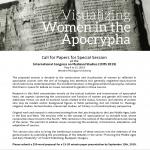There are actually multiple ways that graphic novels and comic books might intersect with academia. In this post, I’ll focus on the study of the genre, highlighting a couple of journals dedicated to the study of comic books that I learned about recently. But one can also express academic content through this medium as well, creating textbooks that incorporate image and text so as to convey meaning more clearly and accessibly either to students or to a wider public.
Via Twitter, I learned about INKS Journal, the journal of the Comics Studies Society. I also learned about Comics Grid: The Journal of Comics Scholarship. Both are open access, as is Open Screens, the journal of the British Association of Film, Television and Screen Studies.
There is a call for papers about Theology and the Marvel Universe, with a deadline of September 15th. I also came across a call for papers for a panel on science and alternative futures. The deadline is August 18th.
If you’re not persuaded that the study of things like fandom and popular culture are worthy of academic investigation, especially by scholars of religion, let me direct your attention to a post about Star Wars legalism on the blog Speculative Faith. Here’s an excerpt:
In some ways, it’s not surprising that we see such vehemence arise in Star Wars fandom. When George Lucas first crafted the stories set in that universe, he tapped into the power of the monomyth, relying on the work of Joseph Campbell. By doing so, he didn’t just create a story, he created a new mythology, something that could and has tapped into the part of the human psyche that responds to myths and legends. That’s a smart idea. It means that his stories, characters, and themes have resonated deeply with people for decades. That’s why the franchise has such strong staying power.
But there’s a flipside to that as well: that yearning for deeper meaning and mythology is right next door to the part of the human mind that responds to myth and religion with fanaticism. And oftentimes, that fanaticism expresses itself by turning people into gatekeepers. They believe that they have to protect their precious mythology and beliefs from those who don’t appreciate or understand it the way they do. These newcomers are so different from them and don’t fit their ideas of what a true believer looks like, sounds like, acts like, believes like. Threatened with outsiders and newcomers, the temptation is to circle the holy wagons and dictate who can and can’t come in.
I think this helps explain what we’re seeing in the Star Wars fandom. The precious orthodoxy of certain fanboys’ vision has been threatened by girls and minorities (never mind that there have been female and minority fans from the beginning), so they respond with gatekeeping behavior. The newbies don’t “do Star Wars” the right way? Then those heretics have to be stricken from the canon and treated as anathema.
See too the New Humanist article on economics as science fiction, which is in fact an excerpt from the edited volume Economic Science Fictions:
The fact that markets are political and ethical constructs confirms my assertion about the second sense in which economics is SF, namely its belief that scientific progress will ultimately solve all economic problems. If markets have political and ethical foundations, economic problems will not disappear even with sufficient progress in science and engineering, as political and ethical disagreements will never disappear – unless you live in the world of George Orwell’s 1984, in which all dissent is stamped out. Indeed, as I will discuss later, many SF writers imagine worlds in which scientific progress has created a very high level of material prosperity but made people miserable, or has even destroyed their very humanities in one way or another.
To say that much of economics is science fiction in the negative sense of the word doesn’t mean that the relationship between economics and science fiction has to be negative. As I mentioned at the beginning, both science fiction and economics can benefit from greater interaction with each other…
Having said that SF writers would benefit from having better knowledge of economics, I would hasten to add that the main beneficiaries from the interaction would be economists. From the beginning SF has been a very powerful way for us to imagine alternative realities in which very different technologies have changed our institutions and thereby individuals, forcing us to rethink the assumptions about institutions and individuals that economists take for granted in analysing the economy.
So, for example, countless dystopian science fictions depict a world in which the destruction of modern technologies by some disaster has brought down modern institutions, such as the state (democratic or not), democracy, the ban on the class system or other explicit forms of discrimination, or moral norms restraining aggressive or apathetic behaviour by individuals…Almost invariably, in these alternative worlds, life is very harsh, because the destruction of modern institutions has made people closer to the self-seeking rationalists idealised in neoclassical economics…
And finally, I recommend reading Kate Marvel’s article in Scientific American on why she won’t debate science. In it she emphasizes that “once you put facts about the world up for debate, you’ve already lost.” She also says, “Climate denial is like bad science fiction: there’s no internal logic, the characters aren’t compelling, and you can see the scary things coming from miles away,” among other things. The whole thing is worth your time.














